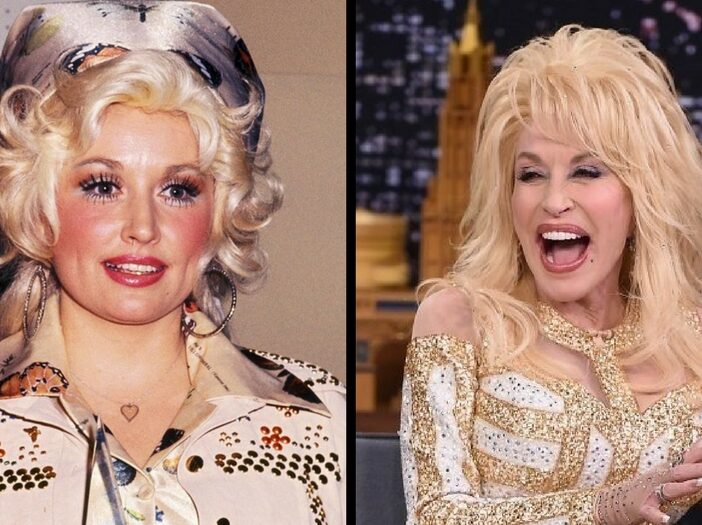
She caught the attention of TV and country star Porter Wagoner
Dolly was 21 years old when she was hired by Porter Wagoner to be the new female vocalist on The Porter Wagoner Show. Dolly and Porter were a hit, and they won many awards for their work together. Porter’s daughter, Debra, said that Parton helped rejuvenate her father’s career and that their working relationship was fantastic, but Dolly had dreams of her own. She had promised to work on Wagoner’s show for five years, and ended up there for seven. During that time, she had a hit with “Joshua,” in 1970, and in 1974 she had three rapid-fire No. 1 songs with “Jolene,” “Love Is Like a Butterfly” and “I Will Always Love You.”
Dolly wanted to go out on her own, and in February of 1974 she announced that she was doing just that. Porter really didn’t want her to go and wouldn’t listen to reason. She wrote “I Will Always Love You” to make him understand, and the song brought him to tears. His daughter says that he told Dolly, “That’s the prettiest song I ever heard. And you can go, providing I get to produce that record.” Wagoner produced Dolly’s records until 1976 and recorded two albums quickly after that, earning her the esteemed CMA Award for Entertainer of the Year in 1978. Dolly Parton was a legitimate solo recording artist, songwriter, and TV personality, but she wasn’t finished. Not by a long shot.
She took on the film industry effortlessly
In 1980, Dolly Parton had her first movie debut in 9 to 5, a comedy also starring Lily Tomlin, Jane Fonda, and Dabney Coleman. Dolly was inexperienced but enthusiastic, so she memorized all the parts in the film in addition to her own. In a 1980 interview with Bobbie Wygant, Dolly said that even though she was over-excited and that movies were so foreign, she felt confident and was sure she could do it. She’d had experience with television, so the only difference was the amount of time making a movie takes. In the same interview, Dolly revealed that she filled the time by writing songs, one of which became the theme song of the movie. That song, “9 to 5,” went to No. 1 on the pop and country charts, and she received an Academy Award nomination. For her first movie!
Dolly’s next movie, The Best Little Whorehouse in Texas, ranked No. 1 the the U.S. box office, knocking out E.T. The Extra Terrestrial, a film that had been at the top for six weeks. Dolly has continued to have a great film career, appearing on the big and small screens, notably in Steel Magnolias, episodes of Designing Women and the Simpsons, and her own movies, Dollywood’s a Christmas Carol, A Country Christmas Story, Dolly Parton’s Christmas of Many Colors, and more.
She became a star without sacrificing her morals

Dolly’s interview with Lawrence Grobel was actually written for Playboy. Dolly appeared on the cover, decked out with bunny ears, lots of cleavage, and a bow tie, but she wouldn’t take her clothes off for the famous magazine. Dolly became aware at an early age that her figure would have an impact on men. In her Bobbie Wygant interview, she talked about turning come-ons into jokes if things got too uncomfortable, and always felt OK walking out the door if things got too weird. She said that she never had to sleep her way to to get where she wanted to go, regardless of how many people tried.
For years, fans speculated as to whether Parton had an affair with Kenny Rogers. The pair recorded the popular duet “Islands in the Stream” in 1983, and their chemistry raised a few eyebrows. Dolly fans know that she would never cheat on her husband, but Rogers addressed the long-held rumor in his book Luck or Something Like It, saying that the pair were wonderful friends, and anything sexual would have ruined their friendship. Dolly never sacrificed her morals for her career.
